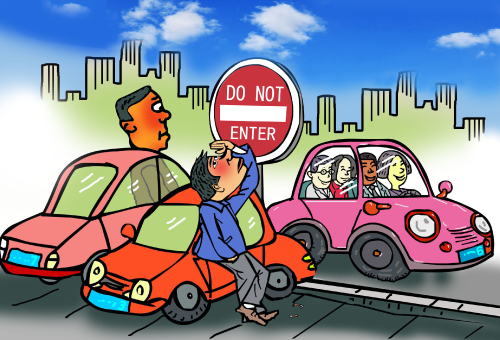 |
|
(LI SHIGONG) |
Beijing Vice Mayor Li Shixiang said in late November that the city will look into the feasibility of adopting an odd-even car plate system, in which cars will be permitted to hit the roads on alternate days depending on whether their number plates end in odd or even numbers.
Currently, cars in Beijing are banned from the roads one day a week, depending on the final digit of their license plates, with two numbers prohibited each weekday.
An odd-even car plate system was put in place from November 3-12, together with other emission reduction measures including temporarily closing factories and construction sites, to create blue skies during this year's APEC meetings in Beijing.
However, the public's responses to making the policy permanent have varied. Some agree the policy will help reduce congestion and improve air quality while others call on the government to be cautious.
Greater efficiency
Han Rui (Beijing Morning Post): The odd-even plate number policy will bring more good than harm. First, the policy will reduce the number of cars on the street and therefore address the problem of traffic congestion, making it more convenient and efficient for residents to travel to work and other places.
Second, air quality will be improved. Putting half of the cars off the roads, coupled with the government's other efforts to reduce pollution, will surely make the air cleaner and improve people's health.
Third, city dwellers will be happier, which will in turn improve their work efficiency and their state of health.
However, if the policy is to be introduced, the government should reduce or waive the vehicle tax on car owners because their cars are out of use every other day. Also, drivers who travel in violation of the ban because of an emergency should be exempt from punishment.
Liu Yuanju (QQ.com): The odd-even number plate policy will mean different things for different income groups.
For those who have a higher income per unit of time, the policy will restrict them from getting stuck on the roads. They may use the time saved to meet more clients and seal more business deals or work more hours in order to make more money. As they have a high income, they can opt for taxis or a second car with a different license plate.
However, for those who have a lower income per unit of time, the policy will bring little benefit. Even if their time of traveling on the roads is reduced, they cannot make use of the time saved to make money. It makes no difference for them whether they listen to music while being stuck on the roads or spend the same time at work. Therefore, this group might be unwilling to accept the policy.
As people with lower incomes far outnumber their more highly paid counterparts, it is understandable that a large number of people would oppose the policy.
